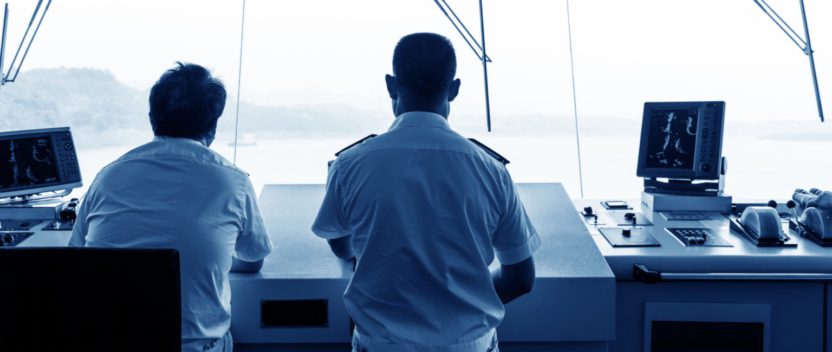Cyber today, carbon tomorrow
Cyber threats, a global economic crisis and energy price fluctuations rank higher in the minds of senior shipping industry executives than air pollution and the effect of natural or man-made environmental disasters.
A survey conducted for the Global Maritime Forum around its recent Hong Kong meeting invited key stakeholders to rank their perceptions on the impact, likelihood, and preparedness on a number of issues potentially affecting the global maritime industry.
Despite – or perhaps because of – the relentless march of environmentally-focussed regulations – the respondents appeared less concerned with shipping’s contribution to pollution or climate change, though the research also found that on many key issues, the industry considers itself unprepared for a significant event or fundamental shifts.
The issue deemed to have the highest likelihood of occurring in the next 10 years is cyber-attacks and data theft; the third-highest issue with regard to perceived impact and the lowest related to preparedness.
Cyber remains a highly pervasive and problematic issue, with research by Gartner concluding that by 2020, 60% of all businesses with digital operations will have suffered major service failure related to digital issues. Furthermore, hacks are often not detected for several months from first inception. IBM has calculated the average time to identify a breach as 197 days, and the average time to contain it a further 69 days.
In monetary terms, IBM concluded that “companies that contained a breach in less than 30 days saved over US$1 million, compared to those that took more than 30 days to resolve the issue”.
The issue deemed to have the greatest potential impact on seaborne trade over the next 10 years is ‘global economic crisis’, which is also ranked as second to last in terms of preparedness.
The perceived lack of preparedness to withstand such a crisis could be related to the market conditions that the industry has been facing in recent years, which made it difficult to build up the financial resilience needed to withstand the impact.
Other industries, by contrast are experiencing the opposite. In the World Economic Forum’s Global Risks Report 2018, no economic issues featured in the top five global risks, which was dominated by environmental and technological issues.
It is little surprise that the issue of ‘energy price fluctuations’ is another of the top three issues measured by impact, given the historic symbiotic nature of energy prices and global economic conditions.
At least here respondents consider themselves better prepared, presumably because the price of marine fuel is so closely tied to crude and therefore subject to long term volatility. Given the high share of fuel to running costs and difficulty in passing on price rises to cargo customers, the maritime industry is more inherently exposed than many other industries to geopolitically-driven oil price fluctuations.
In addition, around 40% of world seaborne trade – more than 4 billion tons in 2016 – is related to the transportation of energy commodities, whether in the form of oil, coal or gas. This means that energy price fluctuations can have a big impact on not just the cost of shipping but to trade flows and volumes.
Owners have been fretting about changing trading patterns for longer than Donald Trump has been US president, and this issue receives the third best preparedness score, indicating that maritime stakeholders are aware of the changes underway.
Among the major drivers is the increasing importance of emerging economies, not least in Asia, which is fuelled by broader demographic and economic trends, and supported by significant investments in infrastructure such as those being embarked on in the context of China’s Belt and Road Initiative.
At the same time, the rise of global protectionism risks putting a brake on the growth in trade and could in a worst-case scenario lead to the unravelling of the current global multilateral trading system anchored by the World Trade Organisation.
None of this is to say that the executives are ignoring the necessity of making the industry cleaner in the long run; they issued a communique during the GMF that is broadly aligned with IMO’s goals for 2050. But in recognising the challenge they appear to be looking at the subject in terms of a long term problem and not something that will be resolved in the next decade.
This is despite the fact that it is only 12 years until the IMO and the industry will agree candidate measures for the decarbonisation programme that will see global CO2 emissions halved by 2050. And as has already been pointed out by some of the IMO’s biggest supporters, the fuels needed to do that do not exist at present.
The GMF research frames the issue in terms of ‘energy efficiency’ and ‘choice of emissions reduction technologies and strategies’ as the issues most likely to influence the sector in the short term.
But since the industry has a decade and more of experience improving energy efficiency those questioned felt they were well prepared, confirmed by the preference for slow steaming, which received the best preparedness score.
The choice of emissions reduction technologies and strategies, on the other hand, is an issue which the industry feels less prepared to take charge of – explained by the fact that none of the competing technological alternatives to fossil fuels are currently seen as sufficiently mature or cost-effective.
This lack of alternatives is also be reflected in the fact that non-fossil fuels and alternative propulsion technologies, both potential pathways to reduced GHG emissions, are perceived to be less significant in impact and likelihood over the next 10 years.
On the face of it, many of the research findings are predictable: not least that there is a long way to go in improving cyber security and is unprepared for the large scale attacks that will surely come.
What must be remembered beyond the other serious but ultimately short term risks is that no amount of efficiency improvements and slow steaming on conventional marine fuels will reduce carbon emissions by enough to meet the agreed IMO targets. Perhaps the next survey should consider what might happen if no viable candidates emerge by 2030 and what the industry’s alternatives will be.


